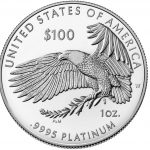(Headline USA) Some Democrats think they may have found a ‘silver bullet’ in the ongoing impasse over the debt limit—except the bullet is made of platinum.
Left-wing radicals have proposed minting a $1 trillion coin and using it to flood the treasury with cash.
Notwithstanding the fact that such a move would turn already skyrocketing inflation into an economic free-for-all, they argue that the aggravation to Republicans alone would make the reckless spending policy worth its mettle.
Even its serious proponents—who are not that many—call the coin a gimmick.
They say it is an oddball way out of an oddball accounting problem that will have severe consequences to average people’s pocketbooks and the economy if it is not worked out in coming days.
But despite all the jokes about who should go on the face of the coin—Chuck E. Cheese? Donald Trump, to tempt or taunt the GOP?—there’s scholarship behind it, too, they claim.
While the economic policy behind this modern-monetary bonanza is thoroughly unsound, its legal foundation may be unsettlingly sterling.
However improbable, it is conceivable the government could turn $1 trillion into a coin of the realm without lawmakers having a say.
This is because a quirky law from more than 20 years ago seems to allow the administration to mint coins of any denomination without congressional approval as long as they’re platinum.

The intent was to help with the production of commemorative coins for collectors, not to create a nuclear option in a fiscal crisis.
Oops.
Specifically, the law says the treasury secretary “may mint and issue platinum bullion coins and proof platinum coins in accordance with such specifications, designs, varieties, quantities, denominations, and inscriptions as the Secretary, in the Secretary’s discretion, may prescribe from time to time.”
This is that time, in the view of $1T coin advocates.
However, the Treasury can’t introduce new currency into circulation; only the Fed can do that.
In theory, the coin would be minted and deposited with the Fed, and its value would make its way into Treasury’s general account and used to pay a whole lot of bills.
In practice, no one knows precisely how it would work and what problems—like the aforementioned inflation—would result.
The idea of a $1 trillion coin got attention in 2013 when President Barack Obama struggled to get Republicans on board.
Donald Marron, a tax policy expert who had led the Congressional Budget Office during part of the Bush administration, thought it wasn’t a great idea—but not a terrible one, either.
“Analysts have considered a range of other options for avoiding default, including prioritizing payments, asserting the debt limit is unconstitutional, and temporarily selling the gold in Fort Knox,” Marron said then.
“All raise severe practical, legal, and image problems,” he said. “In this ugly group, the platinum coin looks relatively shiny.”
Still, he added, it sounds like an Austin Powers sequel or a Simpsons episode: “It lacks dignity.”
Treasury Secretary Janet Yellen, the White House and some Democrats have also slapped down the idea.
“The only thing kookier would be a politically inflicted default,” Sen. Mark Warner, D-Va, said of the coin, while attempting a backhanded attack on Republicans.
GOP proponents of fiscal solvency are currently using the debt-ceiling cap as a bargaining chip against Democrats’ efforts to pass trillions more in superfluous spending for welfare, entitlements and corporate handouts.
But Democrats hope to debase and invalidate their legitimate concerns by answering them in kind with what even Yellen readily admits “is really a gimmick,” as she she told CNBC regarding the platinum coin.
“What’s necessary is for Congress to show that the world can count on America paying its debt,” Yellen said.
Sure it is, said Rohan Grey, a Willamette University law professor and expert on fiscal policy.
“The fact that [the coin] represents an accounting gimmick is a source of its strength, rather than a weakness,” Grey wrote in a 2020-21 study in the Kentucky Law Journal.
“The idea of ‘fighting an accounting problem with an accounting solution’ is entirely coherent … the debt ceiling itself can be viewed as one big, poorly designed accounting gimmick.”
The United States will hit the ceiling Oct. 18 unless Congress acts in time to suspend it.
The two parties are in a stalemate in the Senate over what used to be a routine exercise.
For Democrats in Congress to approve the debt-ceiling raise unilaterally without Republican support could prove to be politically risky as they already face harsh criticism over the Biden administration’s economic stewardship and failure to rebound from last year’s pandemic-spurred crash.
With political consequences looming overhead in the 2022 midterm election, a shiny coin with a 1 and 12 zeroes is tempting to some, regardless of whether that untested and audacious path would actually work.
But fraught questions arise for lots of Democrats as well as Republicans: Would they have wanted President Donald Trump to be ordering up mega-coins like Diet Cokes to his desk? Do they want the next president to have that power? Or even this one?
Other extraordinary workarounds have been floated, too, such as House Speaker Nancy Pelosi’s recent idea of invoking the 14th Amendment’s guarantee that the “validity of the public debt of the United States, authorized by law … shall not be questioned,” which some scholars argue could be used to override the debt limit.
The White House has looked at all such options “and none of those options were viable,” press secretary Jen Psaki said. “So, we know that the only path forward here is through Congress acting.”
The debt ceiling was instituted in the World War I era to make it easier for the U.S. to issue war bonds without needing congressional approval each time. Legislators only needed to stay under the approved total.
Raising or suspending the ceiling has been a mostly uncontroversial task until recent times, because the debt comes mostly from spending that has already been approved by Congress or covers payments mandated by law. Now everything is fodder for a fight to the last minute.
Adapted from reporting by the Associated Press

